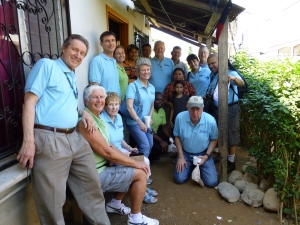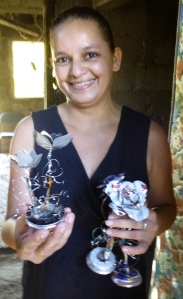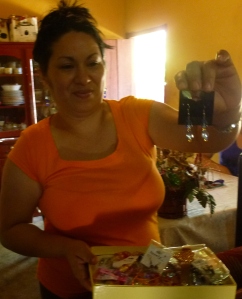 Dense foliage and lush trees part to reveal glimpses of the deep valley below as we bump violently along the unpaved, dusty road between the cities of Marcala and La Esperanza in the Adelante Foundation truck. Climbing slowly, we weave around deep dry ravines in the road, carved out by heavy rains. It is difficult to believe that this route is even passable during the wet season. Yet, it is one of few roadways connecting the agricultural towns of the region with La Esperanza, the capital city of the Honduran department of Intibuca. La Esperanza is also the central trading place for many surrounding communities and has several thriving markets.
Dense foliage and lush trees part to reveal glimpses of the deep valley below as we bump violently along the unpaved, dusty road between the cities of Marcala and La Esperanza in the Adelante Foundation truck. Climbing slowly, we weave around deep dry ravines in the road, carved out by heavy rains. It is difficult to believe that this route is even passable during the wet season. Yet, it is one of few roadways connecting the agricultural towns of the region with La Esperanza, the capital city of the Honduran department of Intibuca. La Esperanza is also the central trading place for many surrounding communities and has several thriving markets.
Although it is one of poorest regions of Honduras, the fertile farmlands of Intibuca provide the bulk of the coffee, potatoes, and vegetables to the rest of the country. It is also unique as it is the home of the indigenous Lenca culture. Having only recently begun working with the Adelante Foundation, this is my first trip to the field. I am accom panied by Sandra Moncada, Adelante’s Director of Education, Oscar Meija, Director of Operations, and Carla Salinas, Education Assistant, who is, as a side note, nearly 7 months pregnant and in my opinion, a very good sport on this jiggly 8 hour journey from La Ceiba. We stop off briefly at an assembly meeting in small mountaintop village called San Jose. The meeting is large – more than 30 women, standing room only. The children gather at the doors, peering around each other to get a glimpse of what is taking place inside. When the women proudly proclaim the Adelante motto, “Unity, Discipline, Hard Work, and Courage! This is our way of life.” the energetic sound spills out into the street and echoes down the cobblestone corridors of the town.
panied by Sandra Moncada, Adelante’s Director of Education, Oscar Meija, Director of Operations, and Carla Salinas, Education Assistant, who is, as a side note, nearly 7 months pregnant and in my opinion, a very good sport on this jiggly 8 hour journey from La Ceiba. We stop off briefly at an assembly meeting in small mountaintop village called San Jose. The meeting is large – more than 30 women, standing room only. The children gather at the doors, peering around each other to get a glimpse of what is taking place inside. When the women proudly proclaim the Adelante motto, “Unity, Discipline, Hard Work, and Courage! This is our way of life.” the energetic sound spills out into the street and echoes down the cobblestone corridors of the town.
We arrive in La Esperanza at dusk. The fading sunlight casts a lovely red hue up into the mountainside opposite. The town is quiet, there are a few people still lingering around the market area, but most have left for home. The air is cool and smells of pine forests and wood burning stoves. It has been nearly 4 years since I last visited this place, but the smells and sounds are instantly familiar and nostalgic. In November 2005, I spent a month here during my training as a Peace Corps volunteer, and the area holds a special place in my heart.
The next morning we awake early and make the 15 minute walk to the downtown Adelante office. There is a meeting today for all the community educators in the region. The women arrive enthusiastic, greeting their Adelante peers with kisses and talking excitedly amongst themselves. These women are the teachers of their community assembly groups. They are here to learned new educational charlas to take back and teach in their bi-weekly assembly meetings. It is evident that these are the leaders: women who help inspire others. The meeting is full of conversation, discussion, and ready participation.
 In the late afternoon, I take a walk up to a hillside shrine, a small cave containing various religious relics. It is a quiet, contemplative spot, with a panoramic view. Looking out on the city itself, it does not appear particularly striking. The streets and buildings are pale and dusty, there are few trees or gardens. But it sits quietly nestled down beneath the pine forests which rise up majestically above it on all sides. What truly lends Intibuca its charm, however, are the Lenca women. Their cheerful headscarves and dresses in vibrant reds, blues and pinks come alive and almost seem set ablaze against the muted colors of the town. The long narrow market draw me in with baskets and bins spilling over with the brightest, freshest vegetables I’ve ever seen. Cool crisp heads of lettuce, green peppers, purple coffee beans, tomatoes and radishes red and ready for eating.
In the late afternoon, I take a walk up to a hillside shrine, a small cave containing various religious relics. It is a quiet, contemplative spot, with a panoramic view. Looking out on the city itself, it does not appear particularly striking. The streets and buildings are pale and dusty, there are few trees or gardens. But it sits quietly nestled down beneath the pine forests which rise up majestically above it on all sides. What truly lends Intibuca its charm, however, are the Lenca women. Their cheerful headscarves and dresses in vibrant reds, blues and pinks come alive and almost seem set ablaze against the muted colors of the town. The long narrow market draw me in with baskets and bins spilling over with the brightest, freshest vegetables I’ve ever seen. Cool crisp heads of lettuce, green peppers, purple coffee beans, tomatoes and radishes red and ready for eating.
Leaving the scene I wander on, until the street gradually opens onto a famili ar spot in the center of town. It is the site of another popular market. When I was here four years ago, there had been a fire which destroyed the market. The plaza on which it stood had been laid bare. At one time – in this very spot – I had stood among a sea of upturned faces, listening to the then presidential candidate, Mel Zelaya speak to the crowd from a temporary stage built up in front of the square. I remember watching their faces as he promised the people reform and change, his charismatic voice booming loud and strong across the plaza. Today, the square is again packed – this time with wooden shacks: an active, thriving marketplace where people rebuilt what once was lost and began again.
ar spot in the center of town. It is the site of another popular market. When I was here four years ago, there had been a fire which destroyed the market. The plaza on which it stood had been laid bare. At one time – in this very spot – I had stood among a sea of upturned faces, listening to the then presidential candidate, Mel Zelaya speak to the crowd from a temporary stage built up in front of the square. I remember watching their faces as he promised the people reform and change, his charismatic voice booming loud and strong across the plaza. Today, the square is again packed – this time with wooden shacks: an active, thriving marketplace where people rebuilt what once was lost and began again.
I continue on my way, turning down a narrow street where I discover the home I once lived in with a local family. Across from the house is the headquarters of the Partido Liberal de Honduras (The Liberal Party of Honduras). The building is locked up tight, an old Micheletti bumper sticker is stuck to the door. I look up to discover flying above the building, the party’s red and white flag. It is dirty, tattered and torn, waving tiredly in the wind. Given the current political situation, the scene seems melancholy but poignant.
 Many things have changed since 2005, but even in the face of current battles, here in the heart of Honduras, the people are resilient. Governments come and go, but the Lenca women and men have been turning this dark, rich soil and sustaining themselves since long before the arrival of Columbus. They have endured the Spanish conquest and before that countless tribal battles. They are a strong people but in the modern day they are faced with a declining culture and are in need of much support. Here in the region of Intibuca, Adelante is working closely in Lenca communities to help provide tools and resources so they can continue to live independent in their traditional agricultural way of life.
Many things have changed since 2005, but even in the face of current battles, here in the heart of Honduras, the people are resilient. Governments come and go, but the Lenca women and men have been turning this dark, rich soil and sustaining themselves since long before the arrival of Columbus. They have endured the Spanish conquest and before that countless tribal battles. They are a strong people but in the modern day they are faced with a declining culture and are in need of much support. Here in the region of Intibuca, Adelante is working closely in Lenca communities to help provide tools and resources so they can continue to live independent in their traditional agricultural way of life.
Coming here has been a powerful experience for me. I have felt inspi red, and my eyes have been opened to the beauty that exists within people and places – even in the harshest environments, even in the day-to-day. During my time with Adelante Foundation, I hope to make many more trips to the field offices around the country. It is a facinating getting to know the clients, hearing and observing first hand how the foundation has helped to improve and enrich the lives of Honduran women and their families.
red, and my eyes have been opened to the beauty that exists within people and places – even in the harshest environments, even in the day-to-day. During my time with Adelante Foundation, I hope to make many more trips to the field offices around the country. It is a facinating getting to know the clients, hearing and observing first hand how the foundation has helped to improve and enrich the lives of Honduran women and their families.
By Desirae Wrathall


























